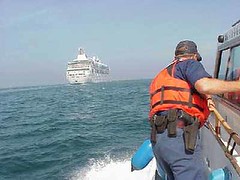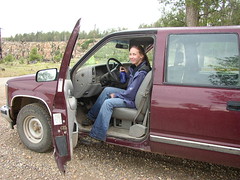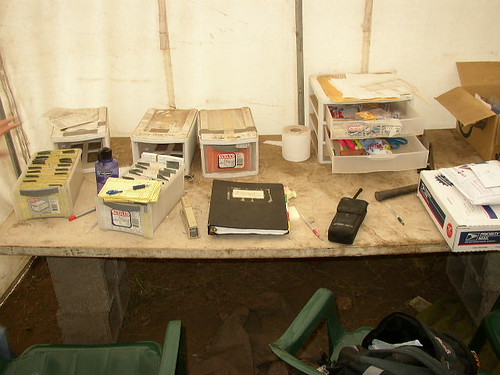…was a strange day.
Not sure what…
…it is about the bagel business, or about this bagel business in particular, but Sam’s Bagels in Charles Village seems to rotate through the hands of ever-changing but always Asian ownership. One constant is the booming, techno-beat pop music they all play. Maybe a broken radio, frozen on one station, comes with the store. This morning I entered to a Spanish-language version of “The Macarena,” which segued into the techno mix of “Desert Mystery,” a mainstay of the genre almost as common as “What is Love?”. I have only to hear a few bars of these songs and I am reminded of driving from Frankfurt to Milan with my truckdriver cousin, who played this kind of music non-stop. Somehow, it was the perfect soundtrack for seeing the sun rise over Europe’s highways and industrial zones from a truck’s cab while feeling a little lonely and isolated due to not really speaking German and also being 17.
There was a customer lingering by the counter who seemed to have already ordered. I was just about to give my own order when she interrupted.
“Um, can I just get my bagel, please?” The customer sounded incredulous and impatient.
“It’s toasting,” replied the woman working by herself behind the counter. She must have pointed toward the toaster, though I was studying the cream-cheese selection and didn’t see.
“In the microwave?” asked the customer. What she was really asking was is that what you people think “toasting” means? “I actually didn’t need it toasted.”
Obviously, the bagel was actually in a toaster. The clerk retrieved it and started packaging it to go, saying something like “it’s warm from oven anyway.”
“I know,” muttered the customer. “That’s why I didn’t exactly need it toasted.”
Yesterday I finished all of the writing and text edits to the massive policy paper I’ve been working on. This means that, from here on out, I only need to care about how it looks, which is a relief. After work I made my semi-usual stop at Dizzy Issie’s. On CNN, showing on a TV behind the bar, there was a picture of the Queen of England next to a headline reading “Beer and Pizza.” People sure are making a lot of fuss over this woman who got her job by being born, but to each his own, I guess. It is interesting to think of her touring Jamestown… actually, no. No, it’s not interesting at all.
At the bar there was discussion of the logistics of Greg’s and Erin’s wedding, scheduled for Memorial Day weekend in Baton Rouge. A. and I will get into New Orleans that Wednesday. We’ll stay two nights in the French Quarter, then move to a Baton Rouge hotel for the wedding weekend proper. One reason to stay in New Orleans at first is the big night out in the French Quarter scheduled for that Thursday night. Those staying in BR will have to find some way home that night, but A. and I will be able to just toddle along to our hotel. I’d mention which one, but I don’t want a bunch of paparazzi showing up.
My brother found himself at John Waters’s house for a Film Festival-related party last night and reports that the famous director favors Gillette shaving products.
I sleep with…
…the window open and wake, sneezing, with flecks of pollen dancing in the air above my bed, suspended in the morning sunlight that pours over the roofs of the rowhouses across the street.
The electrician was here all morning yesterday, into the early afternoon. The trouble with the bathroom’s electrical power was the result of a loose wire in the GFI outlet. Loose or not, it’s so hard to envision what can actually break the connection, considering that we are talking about inanimate objects sealed up inside a wall. Ed, the electrician, a Russian with a neatly trimmed beard, said that vibration would be enough, and he agreed that the problem’s showing up so soon after the plumbers had been doing work nearby (involving ripping out the bathroom vanity) was unlikely to be coincidental. He corrected the problem, electing to eliminate the GFI and replace it with a regular outlet, since the circuit is protected by the new GFI in the hall. “Perhaps I am s***ing in my pocket” by recommending the cheaper course of action, he laughed. Fine by me, I thought. S*** away. I asked him what he thought about just rewiring the house, which still mostly uses the old and disturbingly primitive-sounding “knob and tube” wires. “I think it make your house look like swiss cheese, but not make it very much safer,” he said. “I mean, I love it, because I like to take trip to Colorado with my wife.” Treep to Colorado weeth my woife. “But you don’t need to spend so much.” Instead, he made a sweep of the house, checking behind outlets that looked recently installed and popping open the basement light fixtures, many of which dangled loosely from barely biting screws. He found a lot of what he called “handyman” work; some of it he recommended redoing, though some of it (the refrigerator outlet, for one) he thought was perfectly safe, if “non-standard.”
His work style is to make the rounds with me first so that he can show me what he finds and frighten me into approving the work. As he probed the outlet in the guest room, where my brother is living right now, he asked about A.’s work, and I gave an abbreviated description in which I mentioned that one point of the research project is to monitor for changes in bird mating and other patterns, since these might result from pollutants and — I think this was the term I used — “warming temperatures.” Ed sat back on his haunches and turned to face me with a glint in his eye that I have come to recognize over the years, and I thought, oh, brother, here it comes. “So you really believe humans can make climate warmer?” We pussyfooted around the subject for a little while — I played the well, I’m no expert hand, although I did say that it seems pretty clear that the climate is getting warmer and that humans can reduce the speed of the change by altering some of our practices. Eventually, we got to his real concern: “so you think we should feel as guilty as television says?” I hadn’t thought about this slant on the whole warming-denial thing, that some of the resistance — just like some of the resistance on various civil rights-related subjects — comes from this sense of but I didn’t do it. Resistance to admitting wrongdoing or mistakes seems epidemic in this country just now, with one prominent example set by none other than the president, but wait — aren’t we doing it? Warming the planet, I mean. This isn’t like slavery, about which it is possible — though not particularly compelling as a reason for, say, opposing affirmative action — to say that was more than 100 years ago, I’ve never owned slaves. “Is not our fault BGE uses coal for power,” he explained. “I can’t help it, so I’m not going to feel guilty.”
Around 1:30, Ed’s next appointment was calling to see where he was, so two projects were left undone. He’ll return next Wednesday and that should be the last of the electrical work. I spent the rest of the afternoon mucking around with a spreadsheet analyzing the costs and revenues involved in renting out the house. I’m not sure how best to think about this stuff, but I consider that the “product” we’re selling is a year’s lease on the house, so it makes sense to me to think in terms of “rental years.” Assuming we have a tenant in here as soon as possible after moving, our rental years will be August-July. Figuring on the rent I quoted to the still-prospective tenants I mentioned a week or two ago, and assuming that property management will cost about a tenth of the monthly rent, I also factored in what I’m thinking of “start-up costs,” i.e., all of this electrical and plumbing work (and general contracting for the bathroom and a railing on the front steps still to come), work that we wouldn’t be doing right now if we weren’t going to rent the house out. Figured this way, and assuming that I’m estimating costs right (ha!), it looks like the first year of renting will put us in the red something like $1,500-$2,000. I suppose it’s not so bad for a business to cost money the first year, and of course rental income isn’t the real point of this venture, the point is for us to be able to afford to keep the house long enough for it appreciate in value. Considered this way, I’m fairly confident we’ll be in the green when we sell. Still, it is a disappointment to go from thinking of the rental as an additional source of income to realizing that it will be costing us money instead, at least in the first year.
Around 6 p.m., a friend stopped by and we drove down to the Mt. Vernon First Thursday celebration. My friend had just come from a car dealership where he’d been having brake work done, and he was steaming. He’d needed new rotors. Frustratingly, he’d already had them replaced once before and believed them to be under a lifetime warranty, a belief that the service manager at the dealership did not share. There had been an argument. “I told him, where I come from, the customer is king,” my friend said. The argument did not go his way, although he’s going to gather up his old paperwork and see what recourse he has. But this “customer is king” thing: I hear this all the time, people waxing indignant about how some business treated them. Isn’t the customer always right?, they huff. I think people misunderstand the concept. We’re talking about a strategy for building reputation and customer base, not a constitutional protection. A business can decide as a matter of policy that its staff should behave as if the customer is always right, and this might be a good idea for a business trying to make a name for itself, but I can also see a business not minding if its employees act on a determination that a particular customer is actually wrong. What if the customer mistakenly believes he should be getting something for free? How does the business benefit from behaving as if that customer is right? If you don’t feel that a business treated you fairly, you shouldn’t do business with them anymore (and if they’re doing something illegal, you should report them). But just because you’re a customer doesn’t mean you automatically get to win every argument. The argument must have merit, too. The rule can probably be restated as when it’s not clear whether the business or the customer is right, the benefit of the doubt should usually go to the customer, unless it establishes an unprofitable precedent. Although I suppose that customers you absolutely want to keep are always right. Make of that what you will.
My friend and I wandered Mt. Vernon Square for a little while, catching fragments of the music from the stage, waiting in immensely long lines for plastic cups of beer, and enjoying the crisp, clear evening. The tulip bed in the northern arm of the square glowed pinkish red in the low-angle sunlight. I ran into a few classmates from my recently concluded grammar class. One of these is going on the program’s two-week trip to Florence this summer. She said she is nervous and I told her about my essentially spiritual experience visiting Italy when I was 20. I returned from the trip recharged in a way, my faith in humanity high, basically just because a bunch of strangers were extremely hospitable, plus good wine was so cheap. I’m not sure I convinced her, but I don’t know how much traveling she’s ever done.
It was nice to be back on the square. When I first moved to Baltimore, I took an apartment on Park Avenue, just two blocks from Mt. Vernon square, and I got used to having ready access to the many festivals and special events that take place there. I lived close enough to walk, but not so close that the noise would keep me up if I turned in early. I decided then and still feel that the square must be one of the most beautifully laid-out public spaces in the world. I suppose that I have neither the architectural knowledge nor quite enough travel experience to really argue such a claim, but I do know that I have always found it somehow exhilarating to walk under those grand buildings, the monument looming overhead.
My friend and I picked up dinner from Thairish and drove back to my house in time for The Office, the only TV show I make any particular effort to watch. I read somewhere recently that the “pained silence” is the show’s real specialty, as opposed to the shiny friendly hilarity that most traditional sitcoms aim for. I think that, if you caught last night’s episode, you will agree that they really hit this mark and then some. There were points when I just wanted to look away. The show doesn’t make use of laugh tracks (a point they use rather well in a series of promotional spots making fun of shows that do, with the tagline “you’ll know when to laugh”), but there are long aching minutes of the show where the only appropriate sound effect would be that of a train wrecking.
Yesterday had its…
…frustrations, but these melted away at dinner with a friend, Erin, at a Mt. Vernon pub called Daugherty’s. I was first introduced to this pub a week or two after moving to Baltimore and I was a regular customer while I still lived in that neighborhood. I still like to get back there once or twice a year, and last night it seemed like the perfect calming destination: dim lights, deep booths with tall dividers, dark brown wood everywhere. It only took a few minutes until I could feel the bad energy melting out of me. Over the first round of drinks, I remarked to Erin that the bartender, a thin woman with curly hair and a perpetually spacey air, had been working there as long I’d been a customer, almost eight years. Just as I was saying this, I overheard the bartender say to another customer that she’d been working there for 16 years. It’s probably a pleasant gig, as these things go. The place does a lot of business but with a very mixed crowd, in terms of age, race, occupation, and so on. It’s low key, a refuge from louder, more hectic bars; it’s probably the rare night when anyone needs escorting out the door.
At home I finished watching Road Warrior. It occurred to me that I’ve never been clear on the precise chronology of these movies. Perhaps the scriptwriters weren’t either. Does Road Warrior take place soon after Mad Max? At the end of Mad Max, Max is last seen turning onto a road into something called a “Forbidden Zone,” which appellation suggests that this is an area that the government, already clearly crumbling, assumes no responsibility for. Presumably, this is where Max still is when, at the beginning of Road Warrior, he finds the fortified oil refinery, led by a Mick Jagger lookalike and menaced by a flamboyant gang, similar to the Toecutter Gang that killed Max’s family — and which was, in turn, wiped out by Max — in the first movie. The embattled fortress residents hope to make it to some far-off alleged paradise (I believe a distance of 2,000 miles is mentioned); if they do, will they be in the relatively civilized place where Max is living and working as a cop in the first film? Maybe, except there is much in the first film to suggest that said “civilization” is on its way out: marauding motorcycle gangs terrify the general populace pretty much at will, no witnesses show up to testify at the trial of one of these gangsters (suggesting that the general populace has no faith that the police offer any substantial protection), and the police comport themselves — and dress, for that matter — only a step above these gangs, anyway. And by the time we get to the third movie, Beyond Thunderdome (which there is no particular reason to watch), it’s clear that there isn’t supposed to be much in the way of recognizable civilization to be found anymore, at least not on the Australian continent. I’d be curious to see a map of the terrain in which these movies take place, just to get a better grasp of what’s happening.
My brother walked in while I was halfway through and shared his observation that the characters in the movie, particularly the gang members, seem to have all been attending some sort of bondage-themed costume party when the inciting apocalyptic world event took place, and to have decided to just commit to this aesthetic indefinitely. There’s something to be said for the intimidation factor of this look — all that leather and straps — but some of the effect is undercut when, for example, the gang’s mohawked second-in-command starts running as Max appears on the horizon in the truck, and we see that he’s not wearing any pants under his chaps. In addition to looking silly, the question immediately arises as to how practical this really is, especially given the gang’s heavy reliance on motorcycles.
I’ve never suspected Lou Dobbs of being smart…
…but what does it say about the CNN “commentator” and wannabe-Huey Long-style fulminator that, while he apparently doesn’t read the New York Times (which, whatever you think of the paper, is just stupid for someone in the news business), he still feels free to make statements like this:
I’ll bet you know about the illegal alien amnesty marches, but I don’t know of a single news organization, electronic or print[,] that pointed out that May 1 is America’s Law Day. The cable news networks gave almost wall-to-wall coverage to the illegal alien demonstrations, but they apparently couldn’t find any American celebrating Law Day.
Strange. In addition to the NY Times mention I noted yesterday, news.google.com turns up 327 mentions.
I guess that’s not as dramatic, though.
*****
Correction: I added the word “wannabe” after Michael Deibert reminded me that, as mixed a reputation as Huey Long has, Lou Dobbs is not qualified even to clean up spit in the shadow of the man’s gravestone, much less hold a candle to Long’s eloquence and guts. In retrospect, I regret dignifying Dobbs by comparing him to an actual man, but now that I went to the bother of learning how to do an HTML “text anchor,” so that readers can jump straight from “wannabe” in the text to this correction, I’m just going to let it stand.
Everyone you ever knew will die
Sad, isn’t it? But meanwhile, everyone you ever knew will live a life that means just as much to them as yours does to you. They will be loved and hated and — if they’re lucky — called on their birthdays by people you can’t even imagine.
The mass email I sent out announcing the Montana move has put me back in touch with some people from my past. (Actually, one of them coincidentally found me through Google, inspired to do some cyber-stalking by the upcoming 15th reunion of our high school class.) I was struck by the synchronicity, then, when I read this:
I have a small obsession with how we live as if all the people we’ve ever known, or have known of, don’t exist. Think about it: Out there somewhere is Tommy Byers, with whom you dug a hole in his dirt-floored garage in Fourth grade. You planned to dig all the way to China but gave up when the hole was just waist-deep, which apparently was enough to bend the connecting rods on his dad’s Chevy when he drove unsuspectingly into it. Why don’t you know of Tommy’s days and ways since then?
What about your old teachers? Those cousins you saw only once a year? Your old lovers and roommates and coworkers? They’re all here on the same little planet, each living an entire life and you living yours as if the other didn’t exist.
I wonder when my…
…Coast Guard hitch will cease to be a standard frame of reference for me? Will it ever? I was discharged from the service almost eight years ago, and yet it doesn’t take much to send me straight back to those dark blue uniforms, those lonely nighttime bridge watches, those exhausting days at sea. Walking to work behind a Hopkins student running for the shuttle bus, a cloud of diesel exhaust washes over me. Suddenly I am back on the pier in Miami Beach, the patrol boat’s Caterpillar engines idling, the diesel stench churning my stomach like an appetizer for the main course, the day or so of seasickness that I’ll endure before I get used to the motion of the ocean again. Sometimes I miss the uniforms and the sense it all made. As the season starts to turn hot here in Baltimore, I have taken to walking to work in shorts and a t-shirt and changing into work clothes I leave hanging on a hook behind my office door. This was standard practice in the Guard as well, everyone trailing into work and disappearing into the berthing area in clothes so casual it was almost as if they were still wearing their pajamas, then emerging onto the mess deck for morning muster sharp and squared away in work uniforms. Then I have to remind myself that “the sense it all made” was simply that I hated being told what to wear and do (and somehow imagined that this would not be part of the civilian world); I was serving my time on out and counting down to freedom, which gave the days a certain kind of clarity but is not ultimately an existence I want to return to. I guess what I felt then — what I miss now, in a way, sometimes — was the freedom of not having a choice. You’re doing something you hate but your’re not responsible for whether you keep doing it. I suppose that’s not really freedom but it is liberating in a way. When I look back at all that with nostalgia, maybe I’m just feeling the discontents and unease of having free will. It’s a weighty thing to have to carry around.
Yesterday was a rare day of driving for me. (I borrowed my brother’s car for the occasion.) First I drove my boss and a co-worker to a meeting with a client. The route took us east through town to Essex, through the kind of industrial/retail environment — warehouses, long squat strip mall blocks — that is so stupefyingly unpleasant and inhospitable to humans that you wonder how the builders were ever allowed to proceed. Then, back in the side streets, a contrast: charming little one-story houses with chain link fences and yards kept with obvious pride. I sometimes catch myself in a reverie of a suburban existence (that’s where I spent my childhood), my kids playing with neighbors’ kids, me pitching in with neighbors to coach a Little League team or raise a barn. But then I’d have to fit in, have to accept the project of living and getting along with others on a quiet suburban street as a worthy end in and of itself, and I just don’t know if I have the temperament, or maybe I just haven’t found the right street yet.
On the way back to work, we were sitting at a traffic light next to a bus stop, up the hill from the elementary school that overlooks Lake Montebello. Two boys who looked like fifth graders suddenly fell to the ground in a swirling flurry of punches as the rest of the children crowded around with big smiles. After a few seconds I could see that it wasn’t a serious fight, and, a few seconds later, one of the boys was helping the other to his feet. But for an instant it had looked real, and I had wondered, as I often find myself doing, what to do in these situations. The casual abuse, physical and verbal, that children subject each other to (merely doing exactly what their own parents have done to them, from what I see) in this city is worrying to see. And what distresses me even more is my knowledge that my standards of acceptable behavior for children are different from most of the rest of the community’s. I wish I lived somewhere where I could feel comfortable holding kids like these to account, knowing that their parents would want me, in their absence, to help enforce the basic values we all hold in common. But, watching an impatient young mother in the grocery store pay attention to her clamoring three-year-old only long enough to give him a tooth-rattling, full-force swat on his behind and yelling shut up, or reading news accounts of a mother telling her daughter to go back and fight another girl who in some way “disrespected” her, it is clear that we hold very little in common, and this is a lonely feeling indeed.
After work I drove to Silver Spring to meet with a potential freelance client. Southbound on I-95, I encountered a serious slowdown about a half mile north of 695. I was in the left lane, which is the exit lane for eastbound 695, and I realized that I was positioned perfectly to abandon the mess I was in and cut over to 295, which would also get me to the Silver Spring area relatively efficiently. But was I in a slowdown with an acute cause or was this just the usual state of traffic on this part of I-95 at this time of day? If the latter, 295 might just be more of the same, I thought. I chanced it, and the view from the exit ramp confirmed me in my decision: the backup on 95 appeared to stretch for another mile at least. The traffic flowed relatively more smoothly on 295, though it slowed to a crawl at one point for about five minutes. Whenever I find myself caught in this kind of traffic, my first reaction is a kind of resentment and scorn. I wonder, Why do these people put up with this? As if they have any choice. But what an appalling vista of exhaust clouds and wasted time.
Given all of this, it was somehow a perfect coda to the day to find my brother watching Road Warrior when I returned home from Silver Spring at around 11:00 p.m. Road Warrior is, I think, the fun entry in the Mad Max series, offering as it does the perfect combination of silliness and believeability, the cowering clan in the makeshift fort showing just the right mix of cornered-animal selfishness and unwillingness to entirely cast off their pretensions of civilization. What always strikes me in these movies is the sexual ambiguity of the villains, who are presented as menacing and androgynous (or maybe just pansexual?), with a penchant for wearing mascara and strange tribal costumes involving leather pants, bare chests and feathers. Maybe this offers some insight into what really frightens Mel Gibson, although of course his character wears leather outfits as well.
It occurs to me that these entries don’t seem nearly as interesting when they don’t include a report from Bird Camp. Maybe I should make the Bird Camp reports a separate type of entry, except then I wouldn’t be able to fool myself into thinking that anyone is reading the rest of this stuff.
Happy Law Day, Everyone
The usual difficulty of…
…getting my head back in the game on Mondays was complicated by startlingly beautiful weather, weather better suited for strolling past well-tended Charles Village gardens or through a park, if you can find any in this green-space challenged city. Nonetheless, I finished making text edits to that immense paper I’ve been struggling with and left work with a not entirely unwarranted feeling that it had been a productive day.
On the way home, I stopped at Eddie’s, a small grocery store in Charles Village, for three items I’d forgotten to place on Saturday’s Safeway.com order. The Giant is closer to my house than Eddie’s, and presumably cheaper (although I haven’t studied this), but Eddie’s is always my preference if I need some groceries on my way home from work because I’m inevitably carrying a bag or briefcase, and Giant insists on treating its customers like criminals by requiring everyone to check their bags on the way in. Unless you’re a woman, of course.
Once, I entered the Giant carrying an expensive camera in a small cooler bag (cheaper than and not as obvious as an actual camera bag), and I strode right past the guard without thinking, because it would never have occurred to me to check this bag. “Sir! SIR!” The guard chased me into the store. “You need to check your bag, sir.” I showed her that it only contained a camera (I might have had room to stuff in a few candy bars or packs of gums, certainly not as much as some neighborhood women with their massive tote-style purses could manage), assuming that she would immediately recognize that checking this bag was not an option. She insisted. A., who was with me, said something quite reasonable about how reluctant we were to entrust a camera to strangers, which seemed to really offend the guard, as if she were a knight of the realm, sworn to uphold justice and defend those who cannot defend themselves, rather than a rent-a-cop in a plastic shirt. And I’ve been a rent-a-cop in a plastic shirt, so it’s nothing against her, but come on, “grocery-store security guard” is not a calling, it’s a job. She eventually “let” me carry the camera around my neck, but I had to leave the cooler bag with her. I swore I would never return, but I turned out to be too weak to ignore a supermarket three hundred yards from my front door.
The problem, in addition to my resenting being assumed guilty on my way into a store where I spend about $80-100 every week, is that I’ve seen these “guards” wandering into the store, gabbing on cell phones, doing stretching exercises out on the sidewalk — anything but keeping a close watch on these checked bags, which are arrayed temptingly on a wire shelf just inside the entryway, within easy grabbing range of anyone passing by. And what if something happened in the store that caused a distraction and required the guard’s presence? Who would watch the bags then?
But mainly, it’s the being made to feel like a criminal that gets to me. Walking into the store behind an African-American man who was surprised to have to check his briefcase, I heard him exclaim to the passersby something like it’s a black neighborhood, so this is how they treat us. Exactly. Plus, the managers have to know that — as is the case throughout the retail industry — any significant shoplifting problems they are experiencing are much more likely to originate within their own staff, rather than crafty customers with tinfoil-lined duffel bags. (Um, I understand that’s one way to defeat those alarm sensors by the door.)
After Eddie’s, I picked up my drycleaning at the Mr. Nifty’s on Greenmount, which I mention not because I suspect it is particularly fascinating, but because being able to duck into stores on my way home — on foot — from work is an unusual luxury in this country, even in this city, where you really have to luck out to arrange work, grocery shopping and other necessities within a walkable radius of your home. This kind of human-scale convenience is what some people are already returning to the cities for (the rest will be back when the oil runs out), and it seems to me that we should make it a national goal to make this kind of lifestyle possible for as many people as we can. If you care about the environment, if you want to lessen our dependence on other people’s oil, if you just want a healthier life — all of these goals and more would be met if clean, functioning cities were a residence option for more of us.
And of course this is exactly the kind of thing I think I will miss most in Montana.
A. called around 7:30 p.m. (5:30 p.m. Arizona time). There is no cell phone reception at Bird Camp, which is located in dense forest among rolling hills, so, to check for messages on the official camp phone and keep up her own personal contact with the outside world, every day or so she must drive 20 minutes to the Mogollon Rim, at the southern edge of not only the Coconino National Forest but the entire Colorado Plateau. There on the Rim, where, on a clear day, you can see over 100 miles to the Four Peaks of the Mazatzal Mountains near Phoenix (during the summer, the Rim is a great spot for watching forest fires flare up off in the distance), she erects her antenna and boots up her satellite phone. (Just kidding. Verizon has the Rim covered.)
In last night’s call, A. reported that she had spent much of her day walking the fences of the other enclosures (yesterday I mentioned that one enclosure’s fence had been ruined by a treefall) and was relieved to find that the rest of them are in good shape. In the afternoon, she returned to camp and started preparing training aids that she will use to get all of her crew members on the same page when it comes to estimating horizontal and vertical distance. The project’s data records, as well as day-to-day operations in which some crew members will need to locate nests and natural features based on directions written down by other crew members, depend on everyone having the ability to accurately estimate distance. Her training aids consist of flags staked out along the ground at regular intervals, for estimating horizontal distance, and a rope hanging from a branch about 100 feet off the ground, marked every meter with bright orange surveyor’s tape. (Don’t worry, she didn’t climb up there. Instead, a rock tied to a smaller “messenger” line was thrown over the branch; this smaller line was then used to pull the larger rope into place.)
She also remembered to tell me about a problem that had come up just as she and the core members of the crew were arriving at camp for the first time: the company that held the porta-potty contract last year had, at the last moment, cancelled the contract for this year; a second company was only willing to step in at a monthly rate approximately double what the first company had originally charged for the entire season, which is business-speak for “we don’t really want this contract.” It’s hard to blame them. The nearest town, Happy Jack, consists of a general store and a cafe, and Bird Camp is about 40 minutes away from Happy Jack along gravel Forest Service roads. Not a lot of opportunity for economies of scale and that sort of thing. But fortunately the company had also notified the project’s main office back in Missoula, and the staff administrative assistant — one of those stolid, long-time career professionals that are the backbone of any university — had found a suitable replacement before A. even learned of the problem.
In other standard concerns for anyone responsible for human settlements since time immemorial, there is already a case of bronchitis in the camp; apparently there was a bit of an epidemic last year. I looked up bronchitis on Wikipedia just now, thinking I might be able to find some ideas about keeping it from spreading, and was reminded that it’s not exactly a disease, it’s a condition, i.e., inflammation of the bronchi that may be caused by a variety of bacteria and viruses. Apparently, irritated bronchi are particularly susceptible, which is why smokers so frequently suffer from it. I wondered if the dry, dusty conditions that arise in the camp once the summer heat starts to build might cause a general irritation of this sort. Then the germs — whatever they are – -have only to make short leaps from person to person in the communal eating tent, and before you know it the camp must raise a yellow flag and start burning everyone’s clothes. (Again, not really.)
But back to walking those fences. I’m finishing out my third straight year of working in an office, staring at a computer, and the vision of my wife, striding the hills like some sort of rancher, ruminatively plucking at fence wire with her rawhide-gloved finger, was incredibly romantic. I was overcome with jealousy and told A. how much I would love to have a paid reason to wander in the woods. She didn’t believe me at first. The weird thing is, I think that she believes that other people would find this kind of work boring (although she certainly doesn’t). Can you believe it?
Be honest. You’re positively quivering with envy right now.
I’m not trying to rub it in. I’m quivering, too, although I have also had a lot of coffee this morning.
And the allegedly cruelest…
…month draws to a close. (If I threw in something about bangs and whimpers here, I could have an almost perfectly pretentious and lazy opening. What would make it a trifecta? Something about a shape with lion body and the head of a man?)
As it turned out, I did get some work done this weekend, although not as much as I’d hoped. I spent most of Saturday morning procrastinating getting organized by checking out organizational and anti-procrastination tools online, and so I only managed an hour or two of paper-editing in the afternoon. Then, on Sunday morning, I was busy with the Notebook and with researching the situation in Estonia. I squeezed in another hour or two of paper-editing that afternoon, but then decided to head out and enjoy the perfectly cool, perfectly sunny, early-spring day. The leisurely drive I ended up taking — windows down, car clunking solidly over potholes in the reassuring way that only a large American car can, the sun warm on my arm where it rested on the windowsill, a classic rock station playing “rock blocks” on the radio — lasted longer than planned. I tried to work for a few more hours after The Simpsons, but hit the wall by eleven. At least I got up for a run this morning. That’s only about the fifth time this year, but I’ll take my victories where I can get them.
“What luxury!” my brother called from the kitchen yesterday afternoon. I was sitting at my computer at the dining room table. Of course. He was referring to the now gushing cold water available from the kitchen sink, where once — prior to the plumbers’ Saturday visit, that is — there was only a trickle. Strange, the difference a little improvement like this can make. And, frankly, it does feel like luxury to be able to fill a water bottle quickly, as he was doing, as well as to have a continually topped-off Brita pitcher. (Before, the prospect of waiting the 3-5 minutes necessary to refill it a glass’s worth was unpleasant enough that it often never happened, meaning that the pitcher was sometimes to be found empty in the refrigerator, just a well-chilled piece of clear plastic.) In other words, I’m glad, as A. kept predicting I would be, to have gotten the repair made while I will still be here for a while to enjoy it. Now if only the hot water in the bathroom would start working. To fix it would involve the $800-1,000 job I mentioned before. Jimmy the plumber did suggest that, if I turned the hot water on and off enough times, the fluctuating pressure might dislodge a chunk of whatever is clogging the pipe, although the emphasis seemed to be on might. Hope springs and all that, so I do find myself trying this at least a few times every time I’m in the bathroom, as silly as it feels. We all need our rituals.
Saturday, I made a rare grocery order through Safeway.com that was delivered on Sunday morning, which, if anything is going to make you feel like a solid citizen, that will: standing in the doorway of your villa, receiving provisions from the shop in town, lord of all you survey, jodphurs bulging out of your shiny boots. The spell is broken when you discover that the delivery driver won’t take a tip, even if you thwack your thigh with your riding crop and say “now see here!” Hard to feel superior to someone who won’t take your money, an idea politicians have trouble with.
When I’d placed the order, choosing the items based on names and descriptions and tiny postage-stamp-sized pictures on the web site, I had apparently selected a box of dry laundry detergent approximately the size of a large cinder block. In the evening, I started a load of colors, taking my time, doing everything meticulously, dare I say mindfully? Yes, it’s true, I was centered on the here and now (there and then?) like a Zen priest raking sand. I carefully separated the colors and the whites while I let the water fill most of the way up and form a good head of suds. Then I stirred in the laundry, distributing things evenly. I like taking my time doing little chores like this. It makes me feel grounded and attentive and grown up, good feelings to be able to fall back on when the weight of the months apart piles up and the black dog comes nudging.
(Yes, you just read about me doing my laundry. It’s not my fault, though. No one’s making you.)
A. checked in around 9:00 p.m. from outside of a bowling alley in Payson, about 50 miles from Happy Jack, which is to say right around the corner in Western terms. She and the core members of the field crew were there to celebrate a birthday. She reports that the camp is all set up — “neatly,” as she made sure to mention, or maybe she used the word “orderly.” The rest of the two dozen or so seasonal researchers will trickle in over the next couple of weeks. Meanwhile there are a few problems to attend to. Part of the research performed on this project takes place in fenced enclosures out in the wilds of the Coconino National Forest. The fences are intended to exclude large land animals, I suppose to protect the research (A.: what’s going on in the enclosures, anyway?); as such, no sources of water are enclosed, and so an animal that does get inside stands a good chance of thirsting to death. This almost happened last year when an elk found its way (probably by jumping; these things can grab a startling amount of air) into one of the enclosures. It was a several day project — eventually involving Forest Service law enforcement rangers — to coax the panicked, dying animal out to safety, with one of the rangers getting kicked in the process, I think.
Anyway, in an initial visit to one of the enclosures in the last few days, A. and her team found that a massive ponderosa had fallen on the fence. I believe she mentioned that there was at least one elk inside already, although our conversation got sidetracked and I didn’t hear any further details on this elk. The tree’s trunk is at least 1.5 meters thick, A. reports, making it unlikely that they will be able to cut it up with their own chainsaw. “We’ll probably have to hire a contractor,” she said, although I’m not sure if that will just be for the tree or for repairing the fence, too, fence-stringing being something of an art, from what I understand.
When I went up to bed, I discovered that the light in the bathroom wasn’t working. For some reason, my first instinct was to hit the test button on the ground-fault interrupting (GFI) socket, which is on the same line as the light fixture. The reset button popped out but wouldn’t go back in. I unscrewed the dome from the light fixture and discovered that the bulb was burned out; nothing to do with the GFI at all. But that doesn’t change the fact that the GFI still won’t reset, which means that the light fixture still won’t work, new bulb or no, not to mention that my electric shaver can’t recharge. The horror… The electrician is coming back this Thursday, so I think I’ll just tough it out until then (the skylight makes this easier than it would be otherwise). But what the hell? Is this some side-effect of the work that was just done, which included putting another GFI on the same line (in the hallway)? Does the presence of two GFIs mean that I need to reset them in some particular order? While standing on one foot and rubbing my stomach? Or is it just coincidence?
And, most importantly, how much fun will it be to get calls about stuff like this from our tenants, whoever they are, when we are 2,500 miles away in Montana? I’m leaning more and more toward hiring a local property manager, not least because of my reading of local law that it’s required for absentee landlords, with offenses punishable by a $500/day fine. (Incredible that no one we’ve talked to about doing this rental has yet mentioned this law, but I guess you would only know about it if you yourself had been an absentee landlord.)
Anyway, in a city with as byzantine and oft-ignored a set of landlording laws as Baltimore, I get the feeling that slapping a $500/day fine on this particular offense is their way of signalling that this is one regulation they’d really like you to pay attention to. I hear you, Baltimore City Housing Code, I hear you.












